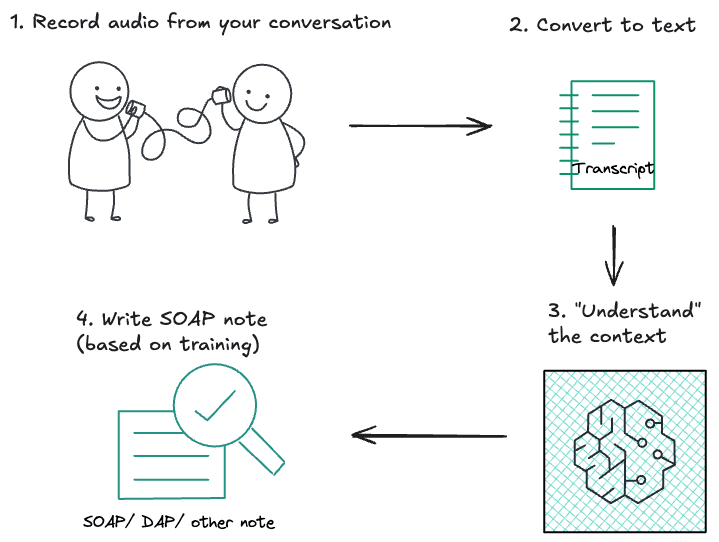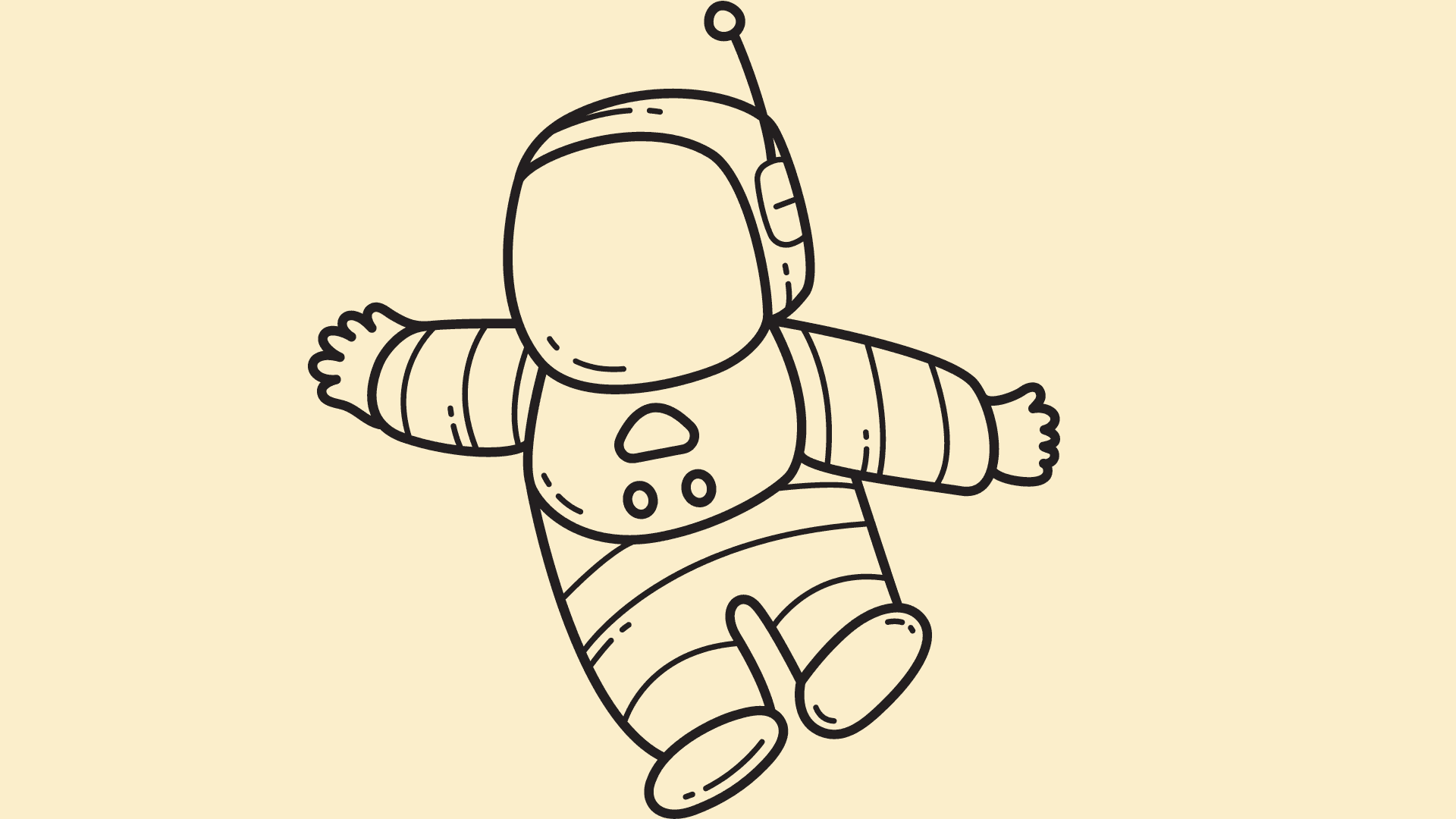If you're a therapist, you know the drill. You spend your day listening, empathizing, and helping your clients navigate their mental health challenges. Then, when your last client leaves, you face a mountain of paperwork. Hours of your evening disappear into the black hole of documentation.
It doesn't have to be this way.
Enter AI Therapy notes (also called AI scribes) - a new category of tools from 2024 that apparently listen to your session and write your notes for you. Magic or not?
How good are they really? Do they write notes as well as you do? Do they capture the relevant bits? How do they work behind the scenes? How secure are they? Let's look at all of that.
The Problem with Traditional Note-Taking
Before we talk about the solution, let's be clear about the problem.
Traditional note-taking for therapists is:
Time-consuming: You spend hours each week writing notes.
Prone to inconsistency: Your notes might vary based on how tired you are or how much time you have.
Often delayed: When you're busy, notes pile up. You end up writing them days after the session, relying on memory.
A cognitive burden: After a day of intense listening and analysis, the last thing you want is more mental effort.
These issues don't just affect you. They affect your clients. Every hour you spend on notes is an hour you're not spending on getting more clients, self-care, or preparing for your next session.
Enter AI Therapy Notes
AI Scribes or AI Therapy Note tools are exactly what they sound like: Session notes notes written by artificial intelligence.
Here's how they work:
Recording: They listen to your session directly once you give them access (with client consent, of course)
Get note: You get a professionally written Session note (SOAP, DAP or any other format) at the end of the session
Review: You review the note, make any necessary edits, and then copy-paste it into your EHR.
It's like having a highly efficient assistant who listens to your sessions and drafts your notes for you. Except this assistant works 24/7, doesn't take vacations, and can process information faster than any human.
The Benefits: More Than Just Time Savings
The most obvious benefit of AI Therapy Notes is time saving. Psychologists report cutting their documentation time by up to 90%. But the benefits go beyond just saving time:
Consistency: Every note follows the same structure, regardless of when you write it or how tired you are.
Accuracy: AI scribe doesn't get tired or distracted. It captures details you might miss.
Insight: Over time, the AI scribe can identify patterns across sessions that humans might overlook.
Timeliness: Notes are generated immediately after the session, when the content is fresh.
Focus: With administrative tasks reduced, you can focus more on your clients and your own professional development.
One therapist who's vocal about these tools on online forums - let's call her Sarah, used to spend 10 hours a week on notes. Now she spends 1 hour. She used those 9 extra hours to start a support group for new mothers, something she'd been wanting to do for years but never had the time for.
How AI scribes work under the hood
AI Scribes might seem like magic, but here's a simplified version of what happens:
Recording: The literal audio waves from your conversation are captured.
Convert to Text/Transcription: The captured audio is converted to text. This technology is highly accurate (99%+) now and can account for a variety of accents and styles of talking.
Understand the context: This is the AI part. The AI analyzes the text to understand its meaning. It identifies key themes, emotions, and clinical relevance. They use natural language processing (NLP) to do this.
Write clinical session note: Here's where the AI scribe writes the note - it uses what it's learned from thousands of therapy sessions to write a coherent note.
The key here is that the AI isn't just transcribing. It's understanding and summarizing.
It knows that when a client says "I've been feeling really down lately," that's likely to go in the "Subjective" part of a SOAP note. Which is why these tools feel magical to anyone who uses it for the first time.

Choosing an AI Therapy Note Tool: What to Look For
Not all AI scribes are created equal. Here's what to consider when choosing one:
Is it designed specifically for therapy/mental health, or is it a generic AI medical scribe?
There are two kinds of tools in the market -
1. AI Therapy Note tools built specifically for psychologists/therapists/mental health
2. Generic AI medical scribes for all medical professionals like physicians, physical therapists etc.
If you're a therapist, the former product will make more sense for a couple of reasons. One, the quality of the note is usually better because it's custom-built for psychologists. For example, the Supanote.ai product is trained with 1000s of real-life insurance-approved session notes. Second, the range of notes an AI Therapy Note tool can write are broader than generic AI medical scribes which tend to do just SOAP notes.
Does it support the specific format you use?
As a therapist you probably have your own way of writing session notes (unlike physicians, who just do SOAP notes). You might use a DAP format (Data, Assessment, Plan), GIRP, BIRP, or PIRP or just your own format. Check if the tool supports that. Tools like Supanote.ai go a step further and learn from your personal style so they write notes just like you.
How well does it capture the nuances of your therapy sessions?
Quality of note can vary widely across tools. So do consistency of quality. You can only check this after you have been using the tool a few times.
Does it work with your existing EHR?
The way most AI scribes for therapy work (or even generic ai medical scribes) - is that they are standalone products. They give you the note, and you have to copy-paste it into your EHR. Although most AI scribes will claim on their websites that they "integrate" with, or "are compatible" with EHRs, what they mean is that they allow you to easily copy-paste into your EHR. The capabilities required to build an AI scribe (AI models, speech-to-text, note-writing) are different from EHRs and so they are currently two different classes of products.
Does it support both in-person and telehealth sessions without having to install something else?
Most psychologists today do a mix of in-person and telehealth sessions. So you want to make sure that telehealth sessions are supported. You should not have to install a separate app or extension (for eg., for zoom) - the basic tools should support both.
Can you dictate if you don't want to record a session?
If your client doesn't consent to having a tool listening in on the session - you should be able to dictate your thoughts into the product in 2 minutes, and have the scribe write a structured note for you. Check if they have a dictate option.
Can the AI Session Notes be adjusted to match your style and preferences?
Don't just take the vendor's word for it. Ask for a free trial. Use it for a few sessions. See how it handles different types of clients and sessions.
Security and Compliance: Non-Negotiables
When it comes to client data in therapy, security isn't just important—it's critical. Any AI note tool you consider should be:
HIPAA Compliant (bare minimum)
If a tool isn't HIPAA compliant, don't even consider it. Explicitly check if they're externally audited for HIPAA compliance - they should be able to show a report. For example, Supanote.ai is audited for HIPAA compliance, with all relevant documents displayed on the website. Many tools claim they're HIPAA-compliant while they may not be - so you need to be able to verify.
How do they handle recordings?
Specifically, how soon after recording the conversation is the audio deleted? Many tools capture the entire audio of your session, then transcribe it, then delete the audio. The audio could reside on their servers for a few hours before At Supanote.ai, it is done real-time in seconds - as soon as the audio is captured, it is transcribed and the original audio deleted. So it is never really captured and stored anywhere
Remember, you're not just protecting your clients' privacy—you're protecting your practice. A data breach could be catastrophic, both ethically and legally.
Pricing
AI note tools typically use subscription-based pricing models. You might see:
Per-note pricing: You pay based on the number of notes you use the tool for
Per-user pricing: A flat fee per month per user
Tiered pricing: The price per note decreases as you use more.
When considering the cost, don't just look at the price tag. Consider the value of your time. If a tool costs $200 a month but saves you 5 hours a week and 20 hours a month, that's $10 per hour. Is your time worth more than $10 an hour? I'm guessing it is.
Also consider the quality of life improvement. What would you do with an extra 20 hours a month? More clients? Professional development? Time with family?
Ethical Considerations
Let's address the elephant in the room: is it ethical to use AI scribes for therapy notes? Here are some points to consider:
Informed Consent: Clients should know that AI is being used in their documentation.
Accuracy: You're still responsible for the accuracy of your notes. AI scribes are a tool, not a replacement for your clinical judgment.
Data Privacy: How comfortable are you with a third party processing your session data?
These are questions each therapist needs to wrestle with. There's no one-size-fits-all answer.
The Future of AI Therapy Notes
AI scribes for Therapy notes are just the beginning. We're likely to see AI tools for:
Diagnosis and risk assessment
Treatment planning
Outcome tracking
Automatic appointment scheduling and reminders
The goal isn't to replace therapists. It's to augment them. To handle the routine tasks so therapists can focus on what they do best: helping people.
Are AI Therapy Note Tools right for You?
The answer depends on your specific situation. Here are some questions to ask yourself:
How much time do you currently spend on notes?
How satisfied are you with your current note-taking process?
How comfortable are you with technology?
What would you do with the time saved by using AI scribes?
If you're spending hours on notes each week, if you're constantly behind on documentation, if you're comfortable with tech, and if you have ideas for how you'd use extra time—then AI scribes for notes might be worth considering.
But if you prefer handwritten notes, if you find note-taking therapeutic, or if you're skeptical of AI—then stick with your current method. The best tool is the one that works for you.
Conclusion: The Future is Already Here
William Gibson once said, "The future is already here—it's just not evenly distributed." AI scribes for therapy notes are a perfect example of this. They're not science fiction. They're not a future possibility. They're here, now, and they're changing how therapists work.
But they're not evenly distributed. Many therapists don't know about them. Many who do are skeptical. Some love them. And that's okay. Every technological advance faces skepticism at first.
The question isn't whether AI will impact therapy. It already has. The question is how we, as therapists, will adapt to and shape this change.
Will we use AI to free up time for more clients, more training, more self-care? Or will we resist it and prefer traditional methods?
There's no right answer. But there is a right question: How can we best serve our clients?
If AI scribes help you do that—by giving you more time, more insight, more energy—then they're worth considering. If not, then they're just another tech fad.
You're the therapist. You decide.
